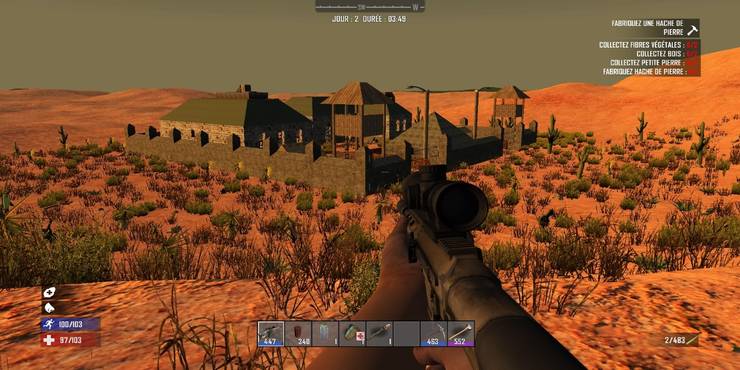13-inch model
- After a long and tedious legal process in a closed auction, The Fun Pimps have re-acquired full console publishing rights on the current and all future versions of 7 Days to Die on PS4 and the Xbox One. We know there still is a steady and healthy 7 Days console community, as we hear from them on our social media channels all the time and the.
- Another free PDF website to grab eBooks and textbooks is BookBoon.com. Users can download over 50 million PDFs from the site. Meanwhile, it is currently the world’s largest online publishing company of eBooks that focuses on short and practical books, IT, business and literature for engineering, etc.
Power to go.
13.3-inch1

Mar 30, 2018 The other type of weapon you can’t craft in 7 Days to Die is guns. However, you will be able to find gun parts and special knowledge books. As soon as you have all the parts and the book, let’s say for an AK47, you will be able to assemble the actual AK47. SSD: KINGSTON SMS200S3120G. GPU: Intel Iris Pro graphics 5200 1177pm Debian GNU/Linux 8 (jessie) 64bit (Gnome Desktop 3.14.1) He runs with 2025 fps on windowed 1024x640 (it's a bit low resoltion but higher drops the frame rate making it hard to play) Resolution: 1024x640, Fullscreen OFF.
Apple M1 chip
Also available with Intel Core i5 or i7 processor
Up to 16GB2
Up to 2TB2
Up to 20 hours4
Backlit Magic Keyboard, Touch Bar, Touch ID, and Force Touch trackpad
Backlit Magic Keyboard, Touch Bar, Touch ID, and Force Touch trackpad
Apple Trade In
Get credit toward a new Mac.
Just trade in your eligible computer. It’s good for you and the planet.*

Free delivery
And free returns. See checkout for delivery dates.
7 Days To Die Book Pro Guide
Find the card for you
Get 3% Daily Cash with Apple Card or get special financing.
Statue of Pheidippides alongside the Marathon Road. | |
| Born | c. 530 BC |
|---|---|
| Died | c. 490 BC |
Pheidippides (Greek: Φειδιππίδης, Ancient Greek pronunciation: [pʰeː.dip.pí.dɛːs], Modern Greek: [fi.ðiˈpi.ðis]; 'Son of Pheídippos') or Philippides (Φιλιππίδης) is the central figure in the story that inspired a modern sporting event, the marathon race. Pheidippides is said to have run from Marathon to Athens to deliver news of the victory of the battle of Marathon.
Story[edit]
The first recorded account showing a courier running from Marathon to Athens to announce victory is from within Lucian's prose on the first use of the word “joy” as a greeting in A Slip of the Tongue in Greeting (2nd century CE).[1]
... Philippides, the one who acted as messenger, is said to have used it first in our sense when he brought the news of victory from Marathon and addressed the magistrates in session when they were anxious how the battle had ended; 'Joy to you, we've won' he said, and there and then he died, breathing his last breath with the words 'Joy to you'. – Lucian (translation by K. Kilburn)[2]
... The modern use of the word dates back to Philippides the dispatch-runner. Bringing the news of the victory at Marathon, he found the archons seated, in suspense regarding the issue of the battle. 'Joy, we win!' he said, and died upon his message, breathing his last in the word “joy” ... – Lucian[3]
The traditional story relates that Pheidippides (530–490 BCE), an Athenian herald, or hemerodrome[1] (translated as 'day-runner',[4] 'courier',[5][6] 'professional-running courier'[1] or 'day-long runner'[7]), was sent to Sparta to request help when the Persians landed at Marathon, Greece. He ran about 240 km (150 mi) in two days, and then ran back. He then ran the 40 km (25 mi) to the battlefield near Marathon and back to Athens to announce the Greek victory over Persia in the Battle of Marathon (490 BCE) with the word νικῶμεν (nikomen[8] 'We win!'), as stated by Lucian chairete, nikomen ('hail, we are the winners')[9] and then collapsed and died.
7 Days To Die Book Pro Download
Most accounts incorrectly attribute this story to the historian Herodotus, who wrote the history of the Persian Wars in his Histories (composed about 440 BCE). However, Magill and Moose (2003) suggest that the story is likely a 'romantic invention'.[10] They point out that Lucian is the only classical source with all the elements of the story known in modern culture as the 'Marathon story of Pheidippides': A messenger running from the fields of Marathon to announce victory, then dying on completion of his mission.[10]
Robert Browning gave a version of the traditional story in his 1879 poem Pheidippides.
So, when Persia was dust, all cried, 'To Acropolis!
Run, Pheidippides, one race more! the meed is thy due!
Athens is saved, thank Pan, go shout!' He flung down his shield
ran like fire once more: And the space 'twixt the fennel-field
and Athens was stubble again, a field which a fire runs through,
'till in he broke: 'Rejoice, we conquer!' Like wine through clay,
joy in his blood bursting his heart – the bliss!
(Mention of a 'fennel-field' is a reference to the Greek word for fennel, marathon, the origin of the name of the battlefield.)
This poem inspired Baron Pierre de Coubertin and other founders of the modern Olympic Games to invent a running race of approximately 40 km (25 miles) called the marathon. In 1921, the length of marathons became standardized at 42.195 km (26 miles, 385 yards).
In any case, no such story appears in Herodotus. The relevant passage of Herodotus is:[11]
Before they left the city, the Athenian generals sent off a message to Sparta. The messenger was an Athenian named Pheidippides, a professional long-distance runner. According to the account he gave the Athenians on his return, Pheidippides met the god Pan on Mount Parthenium, above Tegea. Pan, he said, called him by name and told him to ask the Athenians why they paid him no attention, in spite of his friendliness towards them and the fact that he had often been useful to them in the past, and would be so again in the future. The Athenians believed Pheidippides's story, and when their affairs were once more in a prosperous state, they built a shrine to Pan under the Acropolis, and from the time his message was received they held an annual ceremony, with a torch-race and sacrifices, to court his protection.
On the occasion of which I speak – when Pheidippides, that is, was sent on his mission by the Athenian commanders and said that he saw Pan – he reached Sparta the day after he left Athens and delivered his message to the Spartan government. 'Men of Sparta' (the message ran), 'the Athenians ask you to help them, and not to stand by while the most ancient city of Greece is crushed and subdued by a foreign invader; for even now Eretria has been enslaved, and Greece is the weaker by the loss of one fine city.' The Spartans, though moved by the appeal, and willing to send help to Athens, were unable to send it promptly because they did not wish to break their law. It was the ninth day of the month, and they said they could not take the field until the moon was full. So they waited for the full moon, and meanwhile Hippias, the son of Pisistratus, guided the Persians to Marathon. — Herodotus[11]
The significance of this story is to be understood in the light of the legend that the god Pan returned the favor by fighting with the Athenian troops and against the Persians at Marathon. This was important because Pan, in addition to his other powers, had the capacity to instill an irrational, blind fear that paralyzed the mind and suspended all sense of judgment – panic.
Herodotus, writing about 30 to 40 years after the events he describes, did, according to Miller (2006) in fact base his version of the battle on eyewitness accounts,[7] so it seems altogether likely that Pheidippides was an actual historical figure.[original research?]
Miller also asserts that Herodotus did not ever, in fact, mention a Marathon-to-Athens runner in any of his writings. Whether the story is true or not, it has no connection with the Battle of Marathon itself, and Herodotus's silence on the evidently dramatic incident of a herald running from Marathon to Athens suggests strongly that no such event occurred.[original research?]
The first known written account of a run from Marathon to Athens occurs in the works of the Greek writer Plutarch (46–120 CE), in his essay On the Glory of Athens. Plutarch attributes the run to a herald called either Thersippus or Eukles. Lucian, a century later, credits one 'Philippides'. It seems likely that in the 500 years between Herodotus's time and Plutarch's, the story of Pheidippides had become muddled with that of the Battle of Marathon (in particular with the story of the Athenian forces making the march from Marathon to Athens in order to intercept the Persian ships headed there), and some fanciful writer had invented the story of the run from Marathon to Athens.[original research?]
Modern times[edit]

Spartathlon[edit]
Based on this account, British RAF Wing Commander John Foden and four other RAF officers travelled to Greece in 1982 on an official expedition to test whether it was possible to cover the nearly 250 kilometres (155 miles) in a day and a half (36 hours). Three runners were successful in completing the distance: John Foden (37ʰ37ᵐ), John Scholtens (34ʰ30ᵐ) and John McCarthy (39ʰ00ᵐ).
Since 1983, it has been an annual footrace from Athens to Sparta, known as the Spartathlon, celebrating Pheidippides's run (according to Herodotus) across 246 km (153 miles) of Greek countryside.
- Course records
7 Days To Die Book Perk
- Male: 20ʰ25ᵐ00ˢ, Yiannis Kouros (Greece), 1984
- Female: 24ʰ48ᵐ18ˢ,[12]Patrycja Bereznowska (Poland), 2017
References[edit]
- ^ abcSears, Edward Seldon (2001). Running through the Ages. McFarland. ISBN9780786450770. Retrieved 8 April 2012.
- ^Lucas, John A. A History of the Marathon race 490 BCE to 1975. Pennsylvania State University & Los Angeles 1984 Foundation. Retrieved 8 April 2012.
- ^Lucian (1905). Pro lapsu inter salutandum. Sacred-texts.com. Translated by Fowler, F.G.; Fowler, H.W. Retrieved 14 December 2013.
- ^Kyle, Donald G. (18 September 2006). Sport and Spectacle in the Ancient World. John Wiley & Sons. ISBN0631229701. Retrieved 8 April 2012.
- ^{{cite book |author=Herodotus |url=https://books.google.com/books?id=4wY9AAAAYAAJ&pg=PA374&lpg=PA374&dq=hemerodrome&source=bl&ots=flOHcHqR-n&sig=oKHn39nJN7bbnhQ4npzb1-Z-VWY&hl=en&sa=X&ei=L9SBT6GhOKif0QWbxIHwBg&ved=0CFIQ6AEwBTgK#v=onepage&q=hemerodrome&f=false |via=Google Books |title=Histories |volume=3 |translator1=Southeby, Leigh |translator2=Southeby, S. |year=1806 |access-date=2012-04-08
- ^Larcher, Pierre Henri; Cooley, William Desborough. Larcher's Notes on Herodotus: Historical and critical comments on the History of Herodotus, with a chronological table; translated from the French. London, Whittaker. Retrieved 8 April 2012.
- ^ abMiller, Stephen G. (1 August 2006). Ancient Greek Athletics. Yale University Press. ISBN0300115296. Retrieved 8 April 2012.
- ^University news team (7 September 2011). 'News from the University Press releases 'Bristol team to mark 2,500th anniversary of the first marathon''. University of Bristol.
- ^Herodotus; Waterfield, Robin; Dewald, Carolyn (15 May 2008). The Histories. Oxford University Press. ISBN9780199535668. Retrieved 8 April 2012.
- ^ abMagill, Frank Northen; Moose, Christina J. (23 January 2003). The Ancient World. Dictionary of World Biography. Taylor & Francis. ISBN1579580408. Retrieved 8 April 2012 – via Google Books.
- ^ abHerodotus. Histories. Book VI, 105...106 – via Gutenberg.org.
- ^'Patrycja Bereznowska'. www.spartathlon.gr.
Sources[edit]
- Herodotus (1972) [1954]. Herodotus – The Histories. Translated by de Sélincourt, Aubrey; Burn, A.R. Penguin Classic.
Further reading[edit]

- Frost, Frank J. (1979). 'The dubious origins of the 'marathon''. American Journal of Ancient History. 4 (2): 159–62.
- Giessen, Hans W. (2010). Mythos Marathon: Von Herodot über Bréal bis zur Gegenwart (in German). Landau, DE: Verlag Empirische Pädagogik (= Landauer Schriften zur Kommunikations- und Kulturwissenschaft. Band 17). ISBN978-3-941320-46-8.
External links[edit]
- 'Spartathlon'. spartathlon.gr (home page). Hellas (Greece).
- Belcastro, Luca. 'Pheidippides ... run again!'. Olympic Opera. Italy. 1896.
- 'The Story of the Marathon'. languageinstinct.blogspot.com (blog). March 2010.